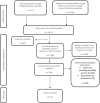Learning from the COVID-19 pandemic for future epidemics and pandemics preparedness and response in Guinea: Findings from a scoping review
- PMID: 36324458
- PMCID: PMC9618875
- DOI: 10.3389/fpubh.2022.879850
Learning from the COVID-19 pandemic for future epidemics and pandemics preparedness and response in Guinea: Findings from a scoping review
Abstract
The outbreak of the novel coronavirus (SARS-CoV-2) in December 2019 prompted a response from health systems of countries across the globe. The first case of COVID-19 in Guinea was notified on 12 March 2020; however, from January 2020 preparations at policy and implementation preparedness levels had already begun. This study aimed to assess the response triggered in Guinea between 27th January 2020 and 1st November 2021 and lessons for future pandemic preparedness and response. We conducted a scoping review using three main data sources: policy documents, research papers and media content. For each of these data sources, a specific search strategy was applied, respectively national websites, PubMed and the Factiva media database. A content analysis was conducted to assess the information found. We found that between January 2020 and November 2021, the response to the COVID-19 pandemic can be divided into five phases: (1) anticipation of the response, (2) a sudden boost of political actions with the implementation of strict restrictive measures, (3) alleviation of restrictive measures, (4) multiple epidemics period and (5) the COVID-19 variants phase, including the strengthening of vaccination activities. This study provides several learning points for countries with similar contexts including: (1) the necessity of setting up, in the pre-epidemic period, an epidemic governance framework that is articulated with the country's health system and epidemiological contexts; (2) the importance of mobilizing, during pre-epidemic period, emergency funds for a rapid health system response whenever epidemics hit; (3) each epidemic is a new experience as previous exposure to similar ones does not necessarily guarantee population and health system resilience; (4) epidemics generate social distress because of the restrictive measures they require for their control, but their excessive securitization is counterproductive. Finally, from a political point of view, decision-making for epidemic control is not always disinterested; it is sometimes rooted in political computations, and health system actors should learn to cope with it while, at the same time, safeguarding trusted and efficient health system responses. We conclude that health system actors anticipated the response to the COVID-19 pandemic and (re-) adapted response strategies as the pandemic evolved in the country. There is a need to rethink epidemics governance and funding mechanisms in Guinea to improve the health system response to epidemics.
Keywords: COVID-19; Guinea; health system preparedness and response; policy decisions; resilience.
Copyright © 2022 Kolié, Keita, Delamou, Dossou, Van Damme and Agyepong.
Conflict of interest statement
The authors declare that the research was conducted in the absence of any commercial or financial relationships that could be construed as a potential conflict of interest.
Figures
Similar articles
-
Addressing challenges for clinical research responses to emerging epidemics and pandemics: a scoping review.BMC Med. 2020 Jun 25;18(1):190. doi: 10.1186/s12916-020-01624-8. BMC Med. 2020. PMID: 32586391 Free PMC article.
-
Toward better pandemic governance and preparedness: South Korea's whole-of-nation approach to COVID-19.BMC Public Health. 2024 Aug 6;24(1):2126. doi: 10.1186/s12889-024-19655-8. BMC Public Health. 2024. PMID: 39107756 Free PMC article.
-
Lessons for the global primary care response to COVID-19: a rapid review of evidence from past epidemics.Fam Pract. 2021 Nov 24;38(6):811-825. doi: 10.1093/fampra/cmaa142. Fam Pract. 2021. PMID: 33586769 Free PMC article. Review.
-
Epidemic and Pandemic Preparedness and Response in a Multi-Hazard Context: COVID-19 Pandemic as a Point of Reference.Int J Environ Res Public Health. 2024 Sep 19;21(9):1238. doi: 10.3390/ijerph21091238. Int J Environ Res Public Health. 2024. PMID: 39338121 Free PMC article.
-
Evaluation of health system resilience in 60 countries based on their responses to COVID-19.Front Public Health. 2023 Jan 9;10:1081068. doi: 10.3389/fpubh.2022.1081068. eCollection 2022. Front Public Health. 2023. PMID: 36699903 Free PMC article.
Cited by
-
Community-based management of a five-arm randomised clinical trial in COVID-19 outpatients in South Africa: challenges and opportunities.Trials. 2023 Oct 4;24(1):635. doi: 10.1186/s13063-023-07577-6. Trials. 2023. PMID: 37794489 Free PMC article. Clinical Trial.
-
Multilevel Governance and Control of the COVID-19 Pandemic in the Democratic Republic of Congo: Learning from the Four First Waves.Int J Environ Res Public Health. 2023 Jan 20;20(3):1980. doi: 10.3390/ijerph20031980. Int J Environ Res Public Health. 2023. PMID: 36767346 Free PMC article. Review.
-
Scoping review of countries' practices missed by health emergency preparedness and response quantitative tools: COVID-19 and Ebola response experiences.BMJ Public Health. 2024 Nov 7;2(2):e001022. doi: 10.1136/bmjph-2024-001022. eCollection 2024 Dec. BMJ Public Health. 2024. PMID: 40018545 Free PMC article.
-
Genetic Diversity and Spatiotemporal Distribution of SARS-CoV-2 Variants in Guinea: A Meta-Analysis of Sequence Data (2020-2023).Viruses. 2025 Jan 31;17(2):204. doi: 10.3390/v17020204. Viruses. 2025. PMID: 40006959 Free PMC article.
References
-
- World Health Organization . COVID-19 Public Health Emergency of International Concern (PHEIC) Global research and innovation forum. World Health Organization; (2020). Available online at: https://www.who.int/publications/m/item/covid-19-public-health-emergency... (accessed March 02, 2021).
-
- World Health Organization . Coronavirus disease (COVID-19) situation reports. World Health Organization; (2020). Available online at: https://www.who.int/emergencies/diseases/novel-coronavirus-2019/situatio... (accessed April 26, 2021).
-
- Mishra A. Africa COVID-19: Impact, Response, Challenges to Recovery. Observer Research Foundation (2020). Available online at: https://www.orfonline.org/research/africa-and-covid19-impact-response-an... (accessed June 01, 2021).
-
- OECD . COVID-19 and Africa: Socio-economic implications and policy responses. OECD Policy Responses to Coronavirus (COVID-19). (2020). Available online at: https://www.oecd.org/coronavirus/policy-responses/covid-19-and-africa-so... (accessed June 01, 2021).
Publication types
MeSH terms
Supplementary concepts
LinkOut - more resources
Full Text Sources
Medical
Miscellaneous




